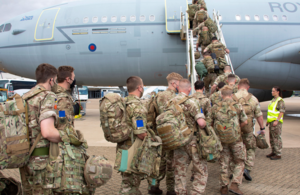UK Government and charities highlight veterans support, in light of situation in Afghanistan
The meeting outlined support available to former service personnel across the UK and agreed to share information and best practice on supporting veterans.
Government, charities and the academic sector met today to highlight the range of support on offer to veterans of the Afghanistan conflict, in light of the difficult situation in the country.
The meeting, co-chaired by Defence Secretary Ben Wallace and Minister for Defence People and Veterans Leo Docherty and attended by the Health Secretary Sajid Javid, brought together government departments, veterans charities and experts in military mental health.
They discussed the potential for the current situation in Afghanistan to impact the mental health of veterans, outlined the support available to former service personnel across the UK and agreed to share information and best practice on supporting veterans through this difficult time.
The meeting agreed that the Office for Veterans’ Affairs (OVA) will monitor the effects that recent events have had on veterans, and bring together experts from health academia to further inform government understanding of the issue. The OVA will be funding phase four of the KCL cohort study looking at veterans health and wellbeing and agreed today to work with KCL to understand how we can measure the impact of current events on the veteran community as part of this study.
Additionally, the OVA and Forces in Mind Trust will work together to explore how to bring veterans who served in Afghanistan together, in order to support each other. Research suggests that these veterans could benefit from ‘supportive comradeship’, particularly among those who served together.
The government and the nation is extremely grateful for the role the armed forces community played in keeping the country safe from the threat of terrorism, through combat operations (known as Op Herrick) and the subsequent train, advise and assist mission, in Afghanistan. While this may be a challenging time for those who served in Afghanistan, veterans should be in no doubt of the significant role they played in serving their country and keeping it safe.
Minister for Defence People and Veterans Leo Docherty said:
The situation in Afghanistan is very difficult and I understand why those from the veteran community who served there with such great distinction will be concerned.
We will always be indebted for your sacrifice and you played a key role in keeping this country safe from the threat of terrorism.
For those who may be struggling, I urge you to access the range of veterans specific support available.
Health and Social Care Secretary Sajid Javid said:
I recognise that the experience of conflict can affect the physical and mental wellbeing of our veterans, and that the events currently taking place in Afghanistan may have a detrimental impact on the mental health of those who served there.
I am committed to ensuring our veterans can access the support they need. The NHS already provides incredible mental health support for our veteran community, but I know there is more to do.
I encourage any veteran who is struggling to cope to reach out for help. Services like Op COURAGE and the Veterans’ Gateway helpline are there for you, so please come forward.
If you are struggling as a result of the recent events in Afghanistan, there is support available across the United Kingdom for veterans and those affected:
In England, veterans and their families in England can get specialist help from the NHS Op COURAGE service.
In Wales, you can reach out to Veteran Therapists in each Local Health Board through Veteran Wales.
In Scotland, veterans can access veteran-led mental health and welfare support through Veterans First Point, part of NHS Scotland.
In Northern Ireland, the Northern Ireland Veterans’ Support Office links individual veterans, veterans’ groups, statutory and non-statutory bodies, and charities supporting veterans.
Anyone in the UK or overseas can also contact the Veterans’ Gateway helpline on 0808 802 1212, or visit the website for advice and signposting to further support, including for families and the bereaved.

